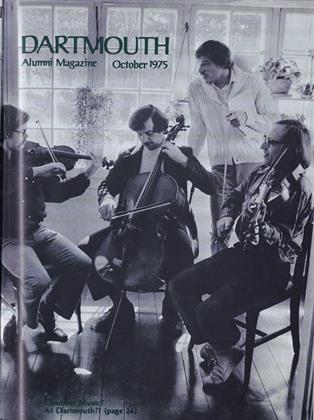IN the summer before his junior year, Mike Ackerman '61 traveled to the Soviet Union on an exchange program that convinced him, he said recently, to "spend my life working against the Soviet system. I left my youth in the Soviet Union. I was 18 or 19 years old and was shocked by the way the system demeaned people. I came back feeling I had to work against the Soviet system."
Until late May, Ackerman was one of the ClA's brightest and most dedicated spies. He was involved in clandestine operations in 20 countries on four continents, infiltrating a hostile embassy - impersonating a Cuban Troskyite to contact African extremists, and breaking a general strike designed to overthrow a South American government.
Now, 11 years after joining the CIA and more committed than ever to struggling against a Soviet system he says frightens him more than "anything else on earth," Ackerman has quit the CIA. He hopes that his story (published by the Knight Newspaper chain) and a fall campus lecture tour will dramatize the erosion of confidence in the CIA caused by increased Congressional and press scrutiny.
Ackerman maintains the CIA is "paralyzed by this wave of investigations, the headlines, and the sensational charges," and believes foreign sources no longer have enough confidence in the agency to share information with it. "The first requirement of an intelligence agency is to be able to assure sources that their information will be kept secret. The CIA can no longer do that because of the political climate."
Ackerman says the decline in confidence in the CIA "can almost be marked on graph paper" from the beginning of the Watergate revelations in 1973. "We were extremely upset with Nixon's willingness to sacrifice the CIA for his own survival," he remarked. In his view the descent of the CIA accelerated with Congressman Michael J. Harrington's involvement with secret testimony on the ClA's role in Chile. "There's a whole group of people both in the press and in politics who are strongly, ideologically opposed to having an intelligence agency. And they're being listened to as authorities on the CIA. The other side just hasn't been presented."
Ackerman has outlined a series of reforms for the CIA, including "stiff penalties" on the release of classified information by government employees; a joint Congressional oversight committee "small enough to be leakproof'; the plugging of legislative loopholes; an explicit prohibition on domestic activities; and a restriction against "large scale paramilitary operations such as the Bay of Pigs or the Laotian operations."
In addition, Ackerman proposes separating clandestine services from more analytical operations undertaken by the CIA, "selecting out" agents "who do not make the grade," and recruiting new officers.
Much of the criticism of the CIA, he believes, is directed against events that happened as many as 15 years ago. "There was an OSS generation that had some very strange operations. The younger agents are much more responsible than that older generation was. Unfortunately, the ghosts of the OSS are still haunting the agency."
Ackerman, who as president of the Young Democrats of Dartmouth campaigned for John Kennedy in the 1960 New Hampshire primary, considers himself a product of the idealism of the early 19605. He no longer believes, however, that the United States will "bear any burden and pay any price" in its involvements abroad.
"We've gone too far the other way now," he says. "We don't have any confidence in our ability to have any kind of positive effect in the world."
 View Full Issue
View Full Issue
More From This Issue
-
 Feature
FeatureBefore the Revolution
October 1975 By ALBERT F. MONCURE JR., RONALD V. NEALE -
 Feature
FeatureA Dialogue for Autumn
October 1975 By COREY FORD -
 Feature
FeatureQuartet in Residence
October 1975 By DAVID WYKES -
 Feature
FeatureA MEMORANDUM
October 1975 By JAMES L. FARLEY '42 -
 Article
ArticleThe College
October 1975 -
 Article
ArticleThe Trolley Never Stopped Here
October 1975 By GEORGE W. HILTON
DAVID SHRIBMAN '76
-
 Article
ArticleFrench Verbs and Javelin Throws
April 1974 By DAVID SHRIBMAN '76 -
 Article
ArticleInn Greeters With a Window on the Green
December 1975 By DAVID SHRIBMAN '76 -
 Article
ArticleReagan Revolutionary
DECEMBER 1981 By David Shribman '76 -
 Books
BooksAdding to the Mosaic
SEPTEMBER 1982 By David Shribman '76 -
 Article
ArticleAlumni Album
MARCH 1983 By David Shribman '76 -
 Article
ArticleThe Last Hurrumph
APRIL 1997 By David Shribman '76







